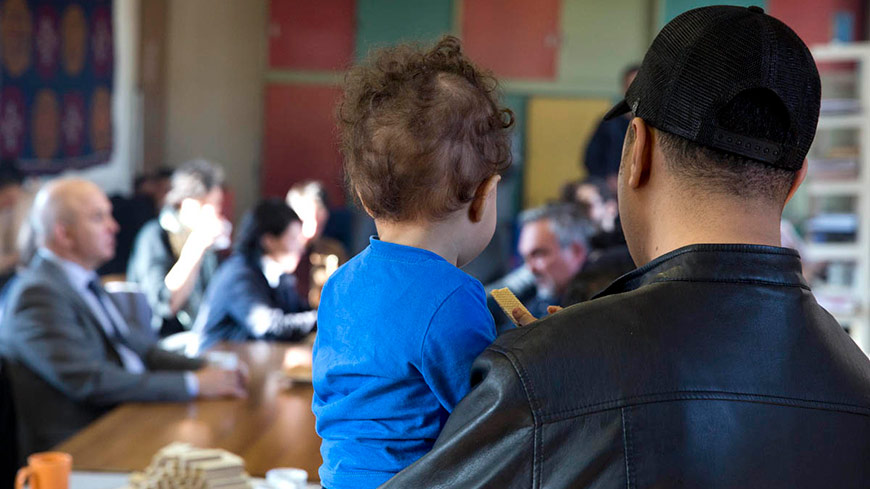“Slovenia has undertaken a number of initiatives in recent years to address major human rights issues concerning migrants, Roma, the “erased” and people living in poverty. It is crucial to reinforce these efforts to ensure that no one is left behind and the human rights of all are upheld”, said Nils Muižnieks, Council of Europe Commissioner for Human Rights, while releasing today a report on his visit to the country in March.
Welcoming Slovenia’s participation in the EU emergency relocation scheme, as well as in the resettlement of asylum seekers from countries neighbouring Syria, the Commissioner encourages the authorities to make systemic adjustments to ensure that the country can handle increasing numbers of asylum applications. “Slovenia is becoming a country of destination for asylum seekers, and the authorities should improve the quality of the services available to them, including by shortening the length of asylum procedures. The authorities should also avoid activating the January 2017 amendments to the Aliens Act because they lack both appropriate guarantees against refoulement and safeguards for the rights of everyone to seek and enjoy asylum,” the Commissioner said.
Furthermore, the Commissioner recommends steps to improve the treatment of unaccompanied migrant minors and children seeking asylum, in particular by prohibiting the detention of irregular migrant children, ensuring children asylum seekers are supported by well trained and qualified staff, and reforming the legal guardianship system. Noting that legislative shortcomings may lead to statelessness for migrant children born en route or in Slovenia, the Commissioner recommends acceding to the relevant treaties on statelessness and amending legislation accordingly.
Commissioner Muižnieks also recommends according particular attention to the social integration of asylum seekers and migrants. While welcoming some positive measures, including the creation of an Office for Migrant Care and Integration, the Commissioner encourages the authorities to boost the chances of integration for asylum seekers - notably those most likely to receive refugee status – by providing language courses and access to the labour market at an earlier stage. He also recommends eliminating the delays in the payment of social assistance to refugees in order to prevent the risk of destitution. The authorities should refrain from adopting measures which would restrict family reunification opportunities for refugees. The Commissioner further recommends that the authorities combat hostility, prejudices and discrimination against asylum seekers and refugees by some parts of the population, through outreach and responsible public discourse on the matter by political figures.
The Slovenian authorities have implemented numerous projects to uphold Roma rights and improve their integration prospects. However, long-standing problems remain, notably in the area of housing, particularly in the Dolenjska region. “Decent housing conditions constitute a precondition to social inclusion and the realisation of other rights. The central authorities should urgently work with local municipalities to resolve the situation of Roma living in substandard conditions,” the Commissioner said.
The Commissioner also highlights the growing phenomenon of child marriages and pregnancies within the Roma community, and recommends setting at 18 years the minimum age for marriages (with exceptions only for children of at least 16 years of age and upon authorisation by a judge); punishing those who facilitate child or forced marriages; and increased awareness-raising efforts in the Roma communities. In order to improve access to quality education and combat absenteeism and drop-outs, the Commissioner recommends pursuing efforts to include Roma pupils in mainstream education, as well as training and hiring more Roma assistants to work with children of different ages, from early childhood education to high school. He further recommends collecting data on the situation of Roma to better target policies, while respecting the confidentiality and private life of the people concerned.
As regards the situation of the “erased” persons – that is, the over 25,000 people who were removed from the official residence registry in the period following the country’s independence in 1991 - the Commissioner welcomes the steps taken to implement the judgments of the European Court of Human Rights as well as the public apology recently issued by the President of the National Assembly. “The erasure was a violation of human rights that caused deep suffering for thousands of people”, the Commissioner said, “The Slovenian authorities should provide a way to regularise the status of the remaining “erased” people who wish to reintegrate into Slovenian society, in particular the small number still living in Slovenia”. The Commissioner also recommends introducing information and analysis about the “erasure” in school curricula and facilitating awareness-raising about this issue.
Lastly, the Commissioner is concerned about the increased levels of poverty. Although Slovenia’s poverty rate is within the EU average, the number of poor people has grown since the 2008 economic crisis particularly among children of vulnerable families, older persons, long-term unemployed and working poor. To address this situation, the Commissioner recommends a number of measures, including lifting any remaining austerity measures; refraining from pension reforms that would result in increased poverty among older persons; upholding the ban on evictions of families with children; removing private medical complementary insurance for the poor; and creating opportunities for sustainable and decent work, including by adjusting the minimum wage. “Slovenia should stay true to its long standing tradition as a welfare state with strong benefits to protect people from poverty,” the Commissioner said, “Social security, the highest attainable standard of health, adequate housing and fair conditions of work are protected human rights under international law. States have the legal obligation to ensure that these rights are made effective for the benefit of all.”














































